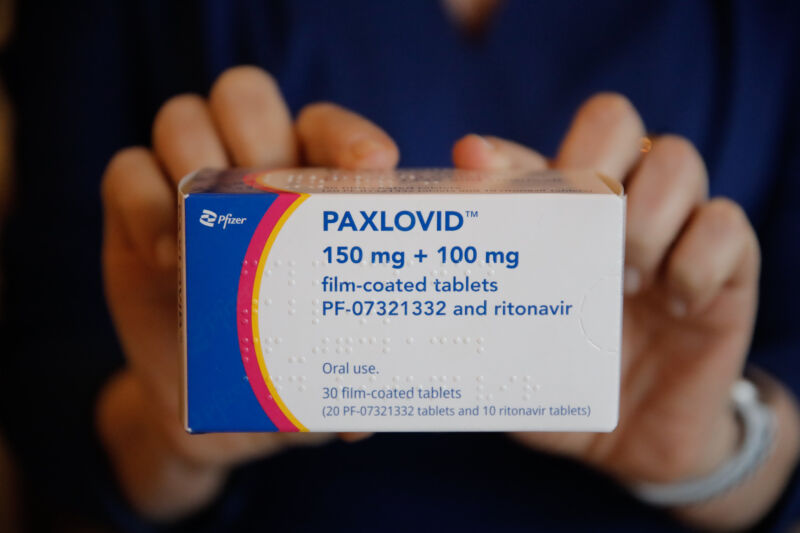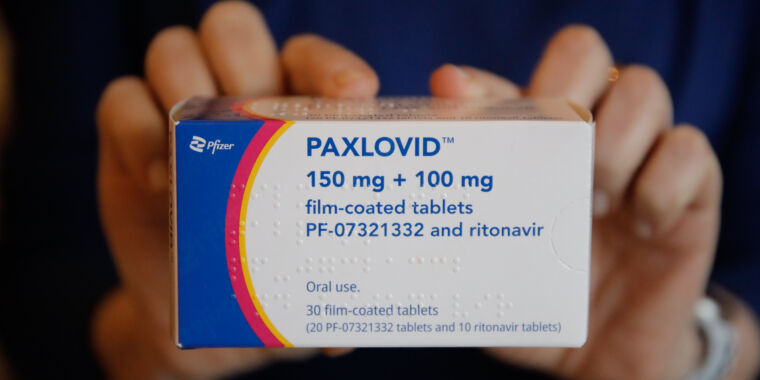
Pfizer’s antiviral pill Paxlovid is among the most treasured tools for hammering COVID-19; it can knock back the relative risk of hospitalization and death by 89 percent in unvaccinated patients at high risk of severe disease. But, as use of the convenient drug has grown in the US, so have troubling reports of rebound cases—people who took the pill early in their infection, began feeling better, and even tested negative but then slid back into symptoms and tested positive again days later.
It’s still unclear just how common the phenomenon is, but it certainly happens in some proportion of Paxlovid-treated patients. In May, the Centers for Disease Control and Prevention even issued a health alert over the rebound reports.
But, amid the rising awareness, it has also become clear that patients who have not been treated with Paxlovid can also rebound. In fact, in Pfizer’s clinical trials of Paxlovid, researchers noted that about 1 percent to 2 percent of both treatment and placebo groups had rebounds.
Together, this has raised a slew of questions: Are the rebounds reignited infections? Are people still infectious? Do they need to resume isolation? Are they again at risk of severe disease? Did their immune systems fail to mount an effective response? Is the virus mutating to become resistant to Paxlovid? Is omicron causing more rebounds than previous variants?
So far, there’s limited data and mostly only anecdotal reports. But a new, small pre-print study led by researchers at the National Institutes of Health offers some encouraging news about COVID rebounds. The study, which included data on seven rebounding patients—six of whom were treated with Paxlovid and one who was not—found no evidence of Paxlovid-resistant mutations, viral replication gone wild, or faltering immune responses.
Intact immune responses
Instead, a detailed look at their immune responses found that rebounds were associated with a surge in antibody and cellular immune responses specific against SARS-CoV-2. At the same time, rebounds were accompanied by downward trends in markers of innate (non-specific) immune responses, as well as levels of SARS-CoV-2 nucleocapsid bits in the blood.
Together, the findings suggest that the rebounds could be partly due to reignited immune response as the body works to clear cellular debris and viral scraps from a quickly smothered infection. Or, as the authors put it: “rebound symptoms may in fact be partially driven by the emerging immune response against residual viral antigens possibly shed from dying infected cells due to cytotoxicity and tissue repair throughout the respiratory tract.”
In further support of this, the authors—co-led by infectious disease experts Brian Epling and Joe Rocco—note that while three of four controls had a recoverable, live virus during their acute infection, only one of the seven rebounding patients had a live virus at the time of their rebound. And that one patient also had underlying immune suppression, which may explain the finding. Further, none of the rebounding patients developed severe disease.
The study is, again, very small and may not be generalizable to all rebound cases. The authors call for rebound studies with larger cohorts. But some elements of the findings are already backed up. For instance, other studies have also failed to identify Paxlovid-resistant mutations. And on Tuesday, the CDC published a study of more than 5,000 Paxlovid-treated patients, finding that less than 1 percent of patients had emergency visits or hospitalizations in the 5-to-15 rebound period after treatment.
For now, the NIH researchers find their new findings “encouraging.” As Epling wrote in a tweet on Tuesday, ” the findings suggest that “an appropriate immune response is developing, so rebound isn’t caused by people not developing an immune response to COVID while on Paxlovid.”








